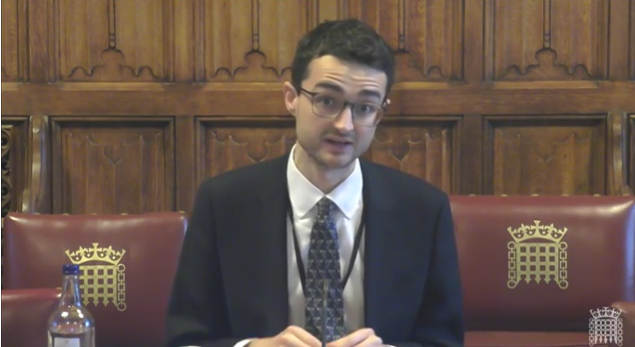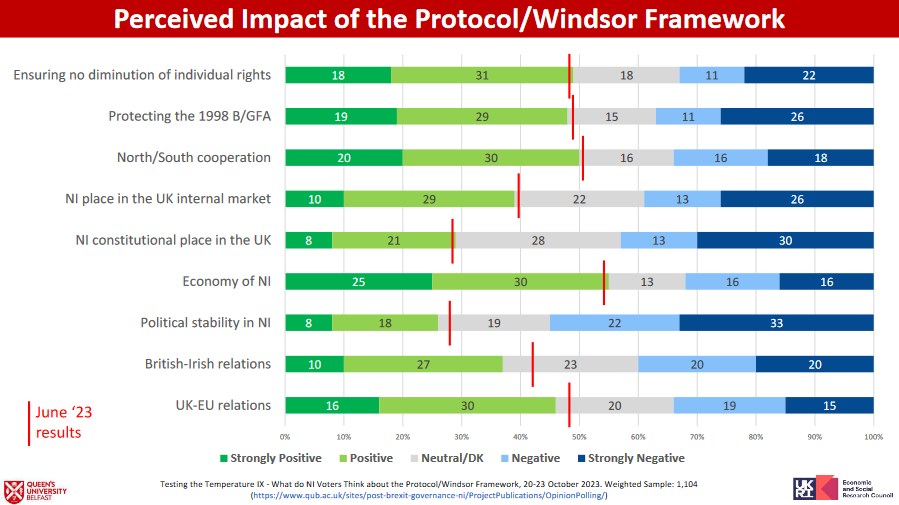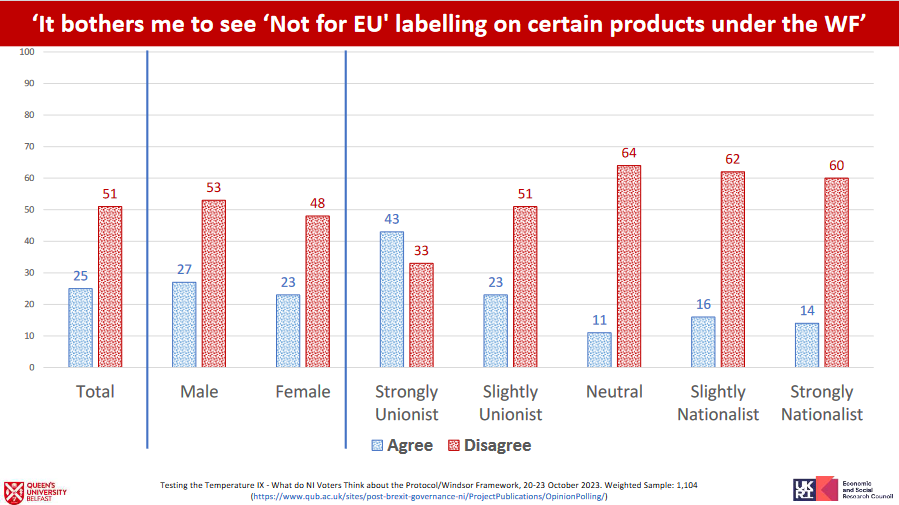Brexit & Beyond newsletter
20 November 2023

Welcome to the 20 November 2023 Brexit & Beyond newsletter
The Lords Sub-Committee on the Windsor Framework is conducting an inquiry into regulatory divergence, and last week heard from experts. QUB has published its latest poll on attitudes to the Windsor Framework. David Cameron has been appointed UK Foreign Secretary, and therefore takes up the role of co-Chair of the EU-UK Joint Committee alongside Maroš Šefčovič.
Regulatory divergence and the Windsor Framework
On 15 November, the Lords Sub-Committee on the Windsor Framework (renamed last week) heard evidence as part of its new inquiry into regulatory divergence. Regulatory divergence refers to differences in UK and EU standards and rules. Dr Lisa Claire Whitten, Research Fellow at Queen’s University Belfast, called divergence an “unavoidable consequence” of the new post-Brexit arrangements whereby Northern Ireland dynamically aligns with EU law on goods. Whitten has written extensively about this legal complexity for NI under the Windsor Framework (WF). Senior Economist at Ulster University Dr Esmond Birnie highlighted two scenarios if divergence between Great Britain and Northern Ireland increases trade friction, and therefore business costs: businesses may sell at higher prices, which has implications for NI’s competitiveness, or GB-NI trade may fall away i.e. trade diversion.

Joël Reland, Research Associate at the UK in a Changing Europe | Source: UK Parliament
Whitten emphasised that EU law still applies to NI producers (in contrast to certain eligible goods from GB which use the green lane). She remarked that there is a “risk of undercutting” for NI producers, presuming that EU rules and standards are more burdensome than UK standards. She noted the potential for increased North-South divergence through the WF and referenced the UK Government’s language in its command paper about the “prospect of significant divergence between the two distinct economies on the island of Ireland”. Services is one area, which is not covered by the WF and where divergence can be expected. Regarding the impact of divergence on individual rights, and in relation to Article 2, Whitten noted research from the NI Human Rights Commission and NI Equality Commission, and a number of EU laws (the Work-life Balance Directive, Accessibility Act, and Pay Transparency Directive), which could be potential areas of divergence between NI and the Republic of Ireland.
Joël Reland, Research Associate at the UK in a Changing Europe and author of its quarterly divergence tracker, said the WF should reduce the administrative burden between GB and NI in theory, but most goods, including manufactured goods, still have to follow EU rules, such as the EU’s planned eco-design regulation, which would have implications for IT goods from GB. “These divergences could build up and complicate trade”, he stated. Reland commented on the ‘Brussels effect’: often businesses outside the EU adapt and conform to new EU regulations as they want to export to the market. However, this doesn’t really apply to GB-NI trade, as NI is not a lucrative market.
James Webber, Partner at Shearman and Stirling, referred to a previous comment made to the committee about NI being in a “no man’s land”. He said divergence affecting businesses is likely to discourage investment, reduce trade, favour incumbents over new entrants, and reduce productivity. He said he’s a “pessimist” about what the WF has achieved and that “an underlying mistake…remains uncorrected” - the application of foreign law over a part of the UK. He stated that the WF has a “meaningful but narrow” amelioratory effect.
In contrast, Anton Spisak from the Tony Blair Institute for Global Change sees the WF as having “quite a substantial effect” on reducing the practical effect of divergence but added that it also introduces uncertainty, as NI producers must continue to follow EU standards. He said this discrepancy and uncertainty may lead to competition and level playing field issues.
Tracking divergence
The Windsor Framework established a new Special Body on Goods (where the EU and UK can discuss future UK legislative changes and their potential impact in Northern Ireland) and a new role for the Office for the Internal Market (OIM) to monitor divergence. Whitten called the new arrangements “welcome but insufficient”. Spisak said there isn’t a lot of clarity from Government on the OIM’s mandate.
Reland told the committee that the Government is tracking divergence, but not systemically. Rather this is “ad hoc” and “siloed”, which means that often NI aspects are overlooked. Whitten echoed this, saying there isn’t joined-up thinking and a strategy to manage divergence. She said that the whole process of dealing with regulatory divergence has been “reactive rather than strategic, and to date it is piecemeal and ad hoc in terms of how it is being dealt with from a Northern Ireland perspective.” She pointed out that there isn’t even an official comprehensive record of what law is applicable in NI under the Windsor Framework. She emphasised that given the “relative certainty”, now is the time to develop those strategies so the issue doesn’t get worse.
Spisak said that if the goal of the UK Government is to minimise the effects of divergence and its negative consequences on businesses, the “single most useful thing” it could do is to clarify where it would continue to align with EU regulations not only in NI, but also in GB. He remarked that it would be better to have convergence by default, and divergence by exception.
Differing approaches to regulation
Webber called the EU’s approach to regulation “complex”, “highlight deliberative…[which] tends to create large volumes of rules which are quite proscriptive in their application”. He described the traditional regulatory style of the UK as “more spartan” and said it is more adaptable and allows contours of legislation to follow real rather than theoretical issues. Webber commented that it will have to be assessed over time whether this way of regulating for the UK will compensate for the reduction in market access to the EU. He said under the Framework, for NI, divergence is “almost always going to be net negative”.
Stormont Brake
Reland said the Stormont Brake has a high threshold, and questioned how, if currently the UK Government seems to have little capacity to track divergence, how the NI Assembly is going to do so. He suggested its use could be “quite limited”. Whitten said the Brake, if triggered, could cause “dual divergence” for NI - NI would follow a historic version of the EU law, which would not apply in rest of the UK, nor in the EU. She noted that the EU could also take remedial measures, which could impact NI’s competitiveness. Webber said the Stormont Brake threshold is set at an “unusably high level”. He remarked on the equivalent in the EEA agreement for member states to resist legislation, which has never been used.
On Wednesday, the Lords Sub-Committee on the Windsor Framework will hear from business representatives on regulatory divergence.
QUB poll on the Windsor Framework
Queen’s University Belfast has published its latest ‘testing the temperature’ poll on the Windsor Framework. The poll was carried out between 20-23 October, and is the ninth poll in the series. It finds that 56% of voters view the Protocol/Windsor Framework (WF) as overall “a good thing for Northern Ireland”; 35% disagree with this statement. 58% of respondents agree that the WF provides an “appropriate means for managing effects of Brexit for NI”; 34% disagree.
The poll indicates that views on the impact of the WF have become slightly more positive; voters are particularly positive regarding its economic impact. 65% think the WF offers unique opportunities that could benefit Northern Ireland. Views are split equally (39%) about whether the WF’s impact on Northern Ireland’s place in the UK internal market is positive or negative. In February 2023, 28% positive were positive about this, 48% negative.

Overall assessment of the current impact of the Protocol/Windsor Framework | Source: Queen’s University Post-Brexit Governance project
Respondents to the poll are also almost evenly split on whether the Stormont Brake “provides MLAs with welcome opportunity to exercise democratic control over changes/updates to EU law applicable in Northern Ireland” - 38% agree with this statement, 36% disagree. 53% agree that UK and EU engagement with NI stakeholders should mean fewer difficulties in the implementation of the WF.
While most voters (56%) want MLAs to vote in favour of the continued application of Article 5-10 of the WF in next year’s democratic consent vote, 34% are against the continued application of EU single market rules in NI. Most voters (69%) agree that UK should pursue closer relations with the EU to reduce frictions on the movement of goods; 17% disagree.
The poll also asked for views on the new ‘not for EU’ labelling requirements. Some dairy and all meat products from GB, which use the green lane, had to be labelled since 1 October. Most (51%) are “not bothered” by this.

Views on the new labelling arrangements | Source: QUB presentation
Other news
- The Scottish Parliament Constitution, Europe, External Affairs and Culture Committee visited the Northern Ireland Assembly last week. The parliamentarians met with MLAs to discuss the operation of the Windsor Framework and Trade and Cooperation Agreement (TCA). The Committee is currently holding an inquiry into the TCA.
- The EU Council has approved the UK’s participation in Horizon Europe and Copernicus. The EU-UK Specialised Committee on Participation in Union programmes will then formalise the agreement by adopting a decision; this is expected before the end of the year.
- On Thursday, the European Parliament will vote on a report on the implementation of the EU-UK Trade and Cooperation Agreement. The report “calls for the swift implementation of the Windsor Framework in order to ensure lasting certainty and predictability for businesses and people in Northern Ireland.” It also “suggests the establishment of a one-stop shop in Belfast where people and businesses could get the assistance they need to navigate the new arrangements set out in the Windsor Framework.”
- The FT reports that the UK intends to introduce taxes on certain carbon-intensive imports in 2026, effectively replicating the EU’s Carbon Border Adjustment Mechanism (CBAM).
- The European Commission intends to allocate tariff-rate quota volumes for five steel product categories for GB to NI trade.
- The Senedd has published a briefing on the Retained EU Law Act, covering some examples of its use in practice, upcoming dates, and implications for devolved governments.
- The Commons Library has published a briefing on touring artists and the UK-EU economic partnership. Post-Brexit arrangements and the end of freedom of movement between the EU and UK have resulted in new barriers to the movement of creative professionals. The Lords European Affairs Committee has highlighted “visa and work-permit arrangements that make it too complicated or expensive for many professionals to work and tour in the EU; cabotage and cross-border trade rules that make it difficult for specialist hauliers associated with touring to continue to operate between the UK and EU; and CITES regulations that significantly complicate travelling to the EU with musical instruments and limit the available routes of travel.”
- The Commons European Scrutiny Committee has launched an inquiry on the EU Entry/Exit System and its potential consequences for the UK’s border. Evidence can be submitted by 12 January 2024.
- The Scottish Parliament Constitution, Europe, External Affairs and Culture Committee has published a letter from its Convener to Michael Gove, Minister for Intergovernmental Relations, which requests annual reports be provided on provisional Common Frameworks. While there is intergovernmental agreement to provide annual reports on Frameworks, only one Framework has been fully agreed; numerous others are currently in force provisionally.
- The UK Government has published its transparency report on intergovernmental relations for quarter 2 of 2023.
- The second meeting of the EU-UK Civil Society Forum took place on 7 November in London. The Civil Society Forum allows EU and UK civil society organisations, such as NGOs, business organisations, and trade unions to submit their views on the Trade and Cooperation Agreement.
- The communiqué of the Inter Ministerial Group for Environment, Food and Rural Affairs (IMG EFRA) meeting on 13 September 2023 has been published. Ministers discussed the implementation of the Windsor Framework, and providing clarity on future labelling requirements. The Comprehensive and Progressive Agreement for Trans-Pacific Partnership (CPTPP) was discussed and the involvement of devolved governments in early discussions regarding relevant EFRA aspects of future free trade agreements. The communiqué of the Inter-ministerial Standing Committee meeting on 19 October has also been published.
- The Specialised Committee for Public Procurement under the Trade and Cooperation Agreement (TCA) met on 16 November.



